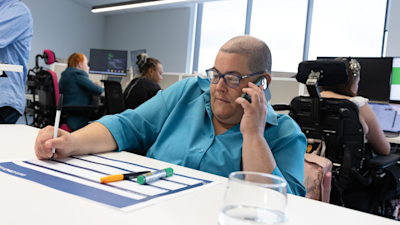Emma Bennison, Manager of Strategic Engagement Disability Employment at Life Without Barriers, reflects on how we can embrace equity this International Women's Day.

Image: Emma Bennison, Chief Innovation Officer, wearing a light pink shirt and dark pants, stands next to a brick wall with a tree behind her. Photography: Jess Oakenfull, commissioned by the Tasmanian Department of Premier and Cabinet.
Emma shares this story with us for International Women's Day. It is written in her own words.
No doubt, I will not be alone in swallowing down a spoonful of cynicism with the obligatory morning tea that accompanies designated days like International Women's Day. Days that remind us to have a think about concepts like this year's theme, “embrace equity”, over a cup of tea and a scone, before returning to regular programming.
This year though, the theme has caused me to reflect on the many times in my life, as a woman with disability, when equity has been missing in action, and what has made the difference in helping me navigate those challenging experiences.
The answer, without exception, has been the presence of strong allies, the people of all genders, with and without disability, and from all walks of life, who have been in my corner.
This got me thinking about what made the impact of those individuals unforgettable, and how we can learn from their example to be better allies.
In my experience, the most effective allies are those who can put the needs of a community ahead of their own interests.
For instance, though I wish there were more of them, I have worked with a small number of CEOs of disability organisations who have stepped aside when they recognised that despite their skill and effectiveness as Chief Executives, as non-disabled people, they were not the best placed to lead organisations whose primary purpose was improving the lives of people with disability. What's more, in doing so, they amplified the voices of skilled leaders with disability and convinced others to follow their example.
Some of the allies I will never forget are the colleagues, friends and family members in my life who have been prepared to call out inappropriate behaviour towards me, even when I did not always recognise it as such.
After a lifetime of discrimination, microaggressions and significantly higher rates of violence and abuse than the general population, many women with disability become anaesthetised to the behaviour that is dished out to us on a regular basis. We internalise it, and too often, we are just expected to let it go.
For this reason, we need strong allies. Not only to name the behaviour, but to empower us with the courage to take action to stop it, including speaking on our behalf when we cannot.
Importantly, allies do not have to be leaders. In my experience, some of the best of them are not. Whatever their status, true allies will often be comfortable enough in their own skin to pass on opportunities to others who they think will benefit more from an experience than they will.
Some of the most transformative learning and development opportunities I have had in my life have been the result of other people's generosity in recommending me in their stead. Even though I’m sure that early in my career, some must have done so with trepidation, being unsure how I would perform as a speaker or advocate.
By now, you may be thinking this being an ally thing sounds a bit too hard, so let me reassure you. If you're a CEO (particularly of a disability organisation), I'm not suggesting you need to resign immediately. What I challenge you to do though, is to take an honest look at who you have around you.
How many of your direct reports are people with disability?
How are you succession planning to ensure the next CEO of your organisation is a skilled and talented leader with disability?
If you're unsure how to identify disabled leaders, the Disability Leadership Institute is a great place to start.
How often have you witnessed or engaged in behaviour towards others that was not appropriate, yet done nothing about it?
If we're honest, we've probably all been guilty of this.
Let’s make a commitment to call out inappropriate behaviour, be it that of others or our own, with courage and compassion, empowering others in the process.
Finally, I'm not recommending that we all pass up brilliant opportunities and offer them to those we perceive as being more marginalised or less experienced than we are. Instead, I'm suggesting that whenever we decide to say no to an opportunity (and let's face it, we all need to learn to do that more often), we could consider who might benefit most if we recommended them to replace us.
Some people worry that doing this will call their subject matter expertise into question. In my experience, the opposite is true. People often come back for future recommendations and recognise you as a great networker.
So, this International Women's Day, irrespective of your position or gender, I encourage you to “embrace equity” by being the best ally you can be. For me, being a great ally will always be a work in progress.
What I know for sure though, is that I've gained more from the experience so far than those I've walked alongside. My hope is that you will too.
Happy International Women’s Day, and thank you to all the allies (too many of you to name) who have empowered me in my quest for equity.


